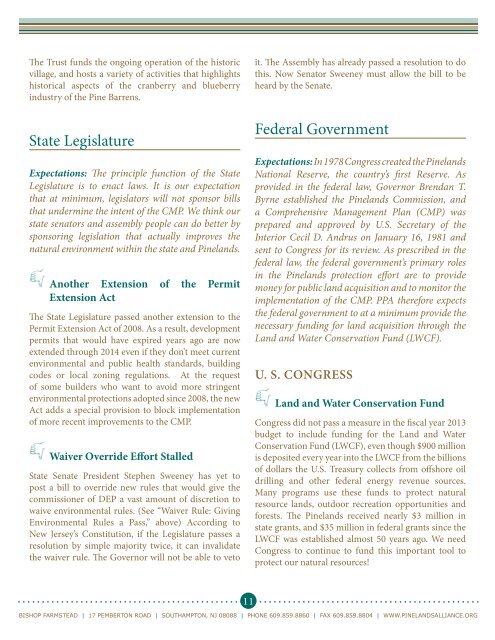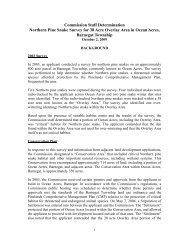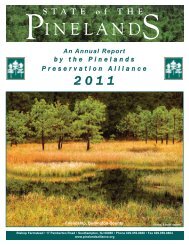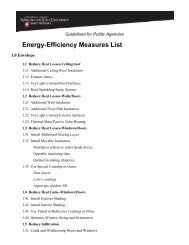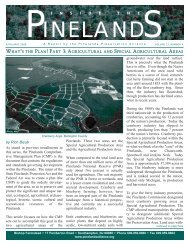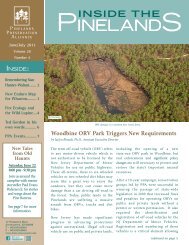State of the - Pinelands Preservation Alliance
State of the - Pinelands Preservation Alliance
State of the - Pinelands Preservation Alliance
Create successful ePaper yourself
Turn your PDF publications into a flip-book with our unique Google optimized e-Paper software.
The Trust funds <strong>the</strong> ongoing operation <strong>of</strong> <strong>the</strong> historic<br />
village, and hosts a variety <strong>of</strong> activities that highlights<br />
historical aspects <strong>of</strong> <strong>the</strong> cranberry and blueberry<br />
industry <strong>of</strong> <strong>the</strong> Pine Barrens.<br />
<strong>State</strong> Legislature<br />
Expectations: The principle function <strong>of</strong> <strong>the</strong> <strong>State</strong><br />
Legislature is to enact laws. It is our expectation<br />
that at minimum, legislators will not sponsor bills<br />
that undermine <strong>the</strong> intent <strong>of</strong> <strong>the</strong> CMP. We think our<br />
state senators and assembly people can do better by<br />
sponsoring legislation that actually improves <strong>the</strong><br />
natural environment within <strong>the</strong> state and <strong>Pinelands</strong>.<br />
Ano<strong>the</strong>r Extension <strong>of</strong> <strong>the</strong> Permit<br />
Extension Act<br />
The <strong>State</strong> Legislature passed ano<strong>the</strong>r extension to <strong>the</strong><br />
Permit Extension Act <strong>of</strong> 2008. As a result, development<br />
permits that would have expired years ago are now<br />
extended through 2014 even if <strong>the</strong>y don’t meet current<br />
environmental and public health standards, building<br />
codes or local zoning regulations. At <strong>the</strong> request<br />
<strong>of</strong> some builders who want to avoid more stringent<br />
environmental protections adopted since 2008, <strong>the</strong> new<br />
Act adds a special provision to block implementation<br />
<strong>of</strong> more recent improvements to <strong>the</strong> CMP.<br />
Waiver Override Effort Stalled<br />
<strong>State</strong> Senate President Stephen Sweeney has yet to<br />
post a bill to override new rules that would give <strong>the</strong><br />
commissioner <strong>of</strong> DEP a vast amount <strong>of</strong> discretion to<br />
waive environmental rules. (See “Waiver Rule: Giving<br />
Environmental Rules a Pass,” above) According to<br />
New Jersey’s Constitution, if <strong>the</strong> Legislature passes a<br />
resolution by simple majority twice, it can invalidate<br />
<strong>the</strong> waiver rule. The Governor will not be able to veto<br />
it. The Assembly has already passed a resolution to do<br />
this. Now Senator Sweeney must allow <strong>the</strong> bill to be<br />
heard by <strong>the</strong> Senate.<br />
Federal Government<br />
Expectations: In 1978 Congress created <strong>the</strong> <strong>Pinelands</strong><br />
National Reserve, <strong>the</strong> country’s first Reserve. As<br />
provided in <strong>the</strong> federal law, Governor Brendan T.<br />
Byrne established <strong>the</strong> <strong>Pinelands</strong> Commission, and<br />
a Comprehensive Management Plan (CMP) was<br />
prepared and approved by U.S. Secretary <strong>of</strong> <strong>the</strong><br />
Interior Cecil D. Andrus on January 16, 1981 and<br />
sent to Congress for its review. As prescribed in <strong>the</strong><br />
federal law, <strong>the</strong> federal government’s primary roles<br />
in <strong>the</strong> <strong>Pinelands</strong> protection effort are to provide<br />
money for public land acquisition and to monitor <strong>the</strong><br />
implementation <strong>of</strong> <strong>the</strong> CMP. PPA <strong>the</strong>refore expects<br />
<strong>the</strong> federal government to at a minimum provide <strong>the</strong><br />
necessary funding for land acquisition through <strong>the</strong><br />
Land and Water Conservation Fund (LWCF).<br />
U. S. Congress<br />
Land and Water Conservation Fund<br />
Congress did not pass a measure in <strong>the</strong> fiscal year 2013<br />
budget to include funding for <strong>the</strong> Land and Water<br />
Conservation Fund (LWCF), even though $900 million<br />
is deposited every year into <strong>the</strong> LWCF from <strong>the</strong> billions<br />
<strong>of</strong> dollars <strong>the</strong> U.S. Treasury collects from <strong>of</strong>fshore oil<br />
drilling and o<strong>the</strong>r federal energy revenue sources.<br />
Many programs use <strong>the</strong>se funds to protect natural<br />
resource lands, outdoor recreation opportunities and<br />
forests. The <strong>Pinelands</strong> received nearly $3 million in<br />
state grants, and $35 million in federal grants since <strong>the</strong><br />
LWCF was established almost 50 years ago. We need<br />
Congress to continue to fund this important tool to<br />
protect our natural resources!<br />
11<br />
Bishop Farmstead | 17 Pemberton Road | Southampton, NJ 08088 | Phone 609.859.8860 | Fax 609.859.8804 | www.pinelandsalliance.org


